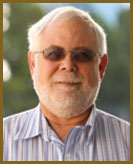From the Editor - March 2015
|
A few months ago, Ken Nemeth mentioned, in his President’s Column, that geologists harbor an intense passion for their profession. To this, I would add that we are also, as a group, quite a curious bunch. We are intrigued by incomplete data sets, challenged by trying to assemble the “jigsaw puzzle” that comes in a box without a photo on the cover, and usually not content with a partial understanding of any issue or problem. |
One of the ways we have to satisfy our curiosity is to ask questions. While seemingly trivial, the ability to ask the right question is a talent. I am sure all of us have worked with colleagues who had an uncanny ability to ask just the right question at just the right time, usually causing us to wish that we ourselves had asked it.
Asking questions is fine and it is important. I believe that how we handle the answer is even more important. This brings me back to the title of this month’s column. According to Webster’s Dictionary, one of the definitions of the verb “to hear” is “to be aware of (sound) through the ear”. The verb “to listen”, on the other hand, is defined as “to pay attention to someone or something in order to hear what is being said, sung, played, etc.” The operative part of this definition, for me, is “to pay attention”. Another definition for listening mentions processing and understanding of what someone is saying. I consider hearing as passive and listening as proactive, requiring some effort.
I am sure we have all participated in meetings or discussions in which someone has asked a question and then neglected to listen to the answer. They may have heard it, but did not make an effort to understand what was being said. This happens not only when posing questions, but also when participating in meetings or presentations. While everyone says that there is no such thing as a dumb question, I would argue that dumb questions do exist and are usually a result of hearing and not listening.
Several years ago a colleague of mine and I were sitting in a meeting where the presentation topic was relatively complex. The presenter did a good job, but the audience had to make a real effort to follow along. It was late in the day and, as usual, there was some lack of focus. My friend leaned over to me and said “They are like dogs watching television. Their heads move in response to changes on the screen and in the sound, but they have no idea what they are hearing”. If you don’t pay attention during a presentation or to the answer to a question you or someone else has asked, you risk becoming one of the “dogs watching television”.
Take the time and make the effort to listen and not just hear.
Visit to the Bindery
The good folks at PrimeSource, the firm that prints our HGS Bulletin, were kind enough to arrange a visit to Marathon Bindery, the firm that binds the Bulletin and prepares it for shipping. This finally gave me the opportunity to witness the entire process involved in the creation of the Bulletin, beginning with the electronic collection of articles and photos, the assembly of a digital version and the printing and assembly of the physical Bulletin prior to mailing to the members. Once again, I found myself impressed by the machinery used throughout the process. I planned to include photos, but it seems the speed at which the machines work is much faster than the focusing ability of my camera. I would like to thank Wayne Emmott, the owner of Marathon Bindery, for taking the time from his busy day to give us a tour of his shop and explain how things were done.

